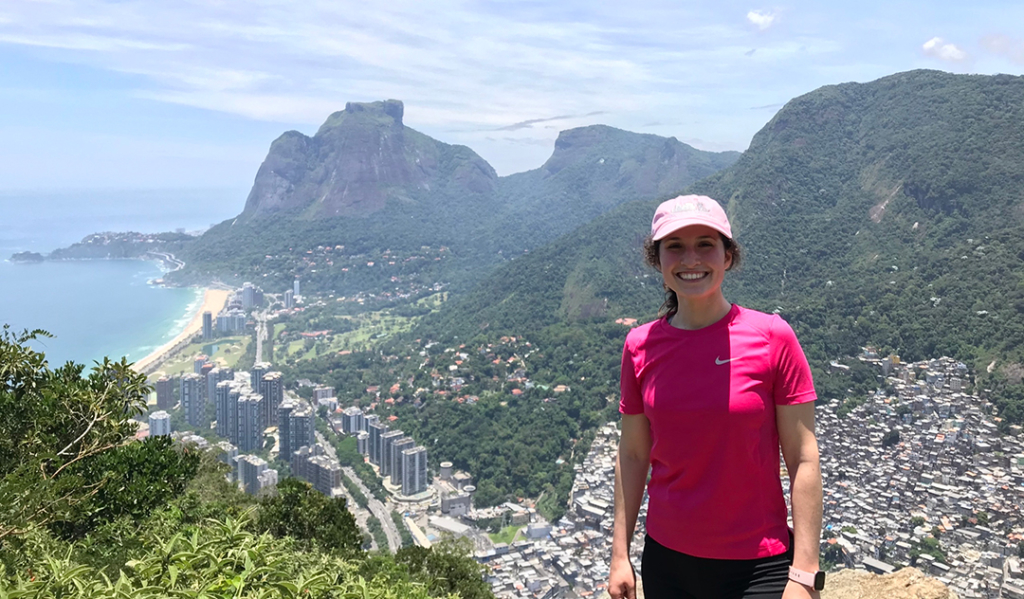Darline Simoni Balen Recognized With an AWWA Academic Achievement Award

Darline overlooking a bustling community during her latest trip back to Brazil in 2019.
By Regina Sibilia
Darline Simoni Balen has been awarded the 2nd Place Master’s Academic Achievement Award from the American Water Works Association (AWWA). The Academic Achievement Award recognizes a person’s contributions to the field of public water supply through either a master’s thesis or a doctoral dissertation.
While pursuing her Master of Science in Civil Engineering from the University of New Hampshire (UNH), Balen conducted research to improve the treatment performance of slow-rate biological filtration (biofiltration). Slow-rate biofiltration is one of the oldest forms of water treatment. It has a history of providing excellent finished water at a low cost, with a simple design, construction, and operation, which makes this an ideal treatment technology for undeveloped or isolated communities.
Working to Help Rural Communities
Balen decided to pursue this line of drinking water research after growing up in Brazil and realizing that slow-rate biofiltration could potentially be adapted to help her home town or any other isolated or rural areas.
“I’ve always wanted to make sure we had access to safe drinking water. Where I grew up, the water we drink does not go through any treatment, not even disinfection with chlorine. Brazil has been making progress in providing safe drinking water, but there is still a lot that needs to be done. I remember from my college classes in Brazil back in 2015 that more than 30 million Brazilians still had no access to safe drinking water. This was shocking to me, especially comparing to what I have seen and experienced here [in America],” explained Balen. “That was something that bothered me, especially when we started to notice an increase in cancer cases where I grew up. That was a big push for me because I had two family members who had cancer. My family lives in a very agricultural area and I always wondered if all these cancer cases could be from pesticides in the water. This drove me to want to work with drinking water treatment.”
Applying DNA Analysis to Drinking Water Research
Beginning her studies in engineering in Brazil, she attended the Federal University of Southern Frontier. As an undergraduate student, she enrolled in a study abroad program that landed her at UNH studying under Dr. M. Robin Collins a Professor of Civil & Environmental Engineering. Dr. Collins encouraged Balen to come back to UNH for her master’s degree and conduct drinking water research.
Balen’s research focused on improving the treatment performance of slow-rate biofilters treating low-carbon source waters. Because slow-rate biofilters are usually used to treat more pristine waters, the organic carbon content in the raw water is usually limited and the filter can take a long time to develop the biological activity needed for treatment. The two-year master’s program consisted of labor-intensive lab experiments where Balen worked through many rounds of trial and error to develop an experimental setup and achieve all her specific research objectives which included:
- Evaluating potential improvements in E. coli removal by slow-rate biofilters treating low-carbon source waters enhanced with selected organic substrates.
- Determine the impact of using low-dose ferric chloride to enhance slow-rate biofilter treatment performance.
- Conducting DNA sequencing analysis and assessing active biomass content to understand the effects of different carbon sources and ferric chloride on microbial communities of slow-rate biofilters.
“My research involved DNA analysis which is something that not many studies had done before,” said Balen. “Biofiltration is one of the oldest technologies, but we hadn’t yet fully understood how the microorganisms in the filters really remove contaminants from the water so that’s what I tried to understand through DNA Analysis. In my research I looked at how adding certain nutrients to the raw water can act as a food source for microbial growth and then monitored how that impacts the microbial diversity and treatment efficiency of the filter.”
Balen worked with two water utilities in Jamestown, Colorado, and Salem, Oregon where pilot studies were conducted. “These water treatment plants were working to remove turbidity from their water, and they applied my findings and it helped. It was very satisfying for me to know my method worked on actual water treatment plants because I had only tested my research in lab scale.”
Receiving the AWWA Academic Achievement Award
As the success of her master’s thesis continued to bloom, Dr. Collins recognized the impact of Balen’s research and asked to submit the thesis for recognition by AWWA.
“I wasn’t expecting this, it wasn’t even me who submitted my thesis, it was my advisor. It was great that he thought my work was worth submitting but I did not have high expectations. But then months later I got the email telling me that I was being recognized. It was a big surprise to me!” she laughed.
As Balen wrapped up her academics and began her professional career, she credits her professors for helping her find her way through a career search in a new country and find a home at Tighe & Bond’s Portsmouth, New Hampshire office. Now she’s meeting with her mentors at Tighe & Bond, working toward her goal of becoming a Project Manager one day.


